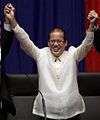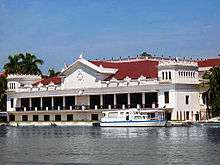Gregorio Pio Catapang
General Gregorio Pio Punzalan Catapang, Jr. (born July 11, 1959) is a Filipino General who served as the 45th Chief of Staff of the Armed Forces of the Philippines.[1] He was the Vice Chief of Staff prior to his appointment as head of the armed forces. He was also the former head of the AFP Northern Luzon Command and 7th Infantry Division. He is part of the Dimalupig Class of the Philippine Military Academy of 1981. He was part of the Reform the Armed Forces Movement.[2][3][4]
Early life and education
Gregorio "Greg" Pio P. Catapang Jr was born on July 11, 1959 in Manila. He is the second of four children of Gregorio Catapang Sr., a lawyer for the Securities and Exchange Commission, and Lourdes Punzalan, a CPA for the Department of Finance. He was named after two generals Gregorio del Pilar and Pio del Pilar. Early on in life his parents taught him the value of public service.
He attended Claret School of Quezon City highschool where he was voted as the high school class president. He entered the Philippine Military Academy in 1977 and graduated in 1981. Shortly after graduating from PMA he pursued graduate courses in the University of the Philippines and became a member of Upsilon Sigma Phi.
Military career
He moved on with his career carrying an excellent standard of performance, fine leadership, and a keen vision that resulted in accomplishments, both in garrison and field tours of duty. He held positions of major responsibility, such as: Commander of the 7th Infantry (Kaugnay) Division, Philippine Army, Commander, 703Bde, 7ID, PA (now 10ID, PA) from September 6, 2010 to October 3, 2012; Battalion Commander of 28IB, 4ID, PA (now 10ID, PA) from November 20, 1999 to March 3, 2001; Battalion Commander of HHSBn, 4ID, PA from March 3, 2001 to December 17, 2001; Ac of S for Operations, G3, 8ID, PA from July 16, 2002 to February 1, 2003; ACUCS for CMO, U7, NOLCOM, AFP in February 19, 2003 to May 12, 2003; ACUCS for Operations, U3, NOLCOM, AFP from May 12, 2003 to October 24, 2005; and Chief of Unified Command Staff, NOLCOM, AFP on May 15, 2005 to Oct 24, 2005.
His professional military training include: Intel Officers Basic Course at the SITS, ISAFP in 1982; Infantry Officers Advance Course at Combat Arms School, TCPA in 1992; Command and General Staff Course at the Training and Doctrine Command at Fort Bonifacio in 2002; Australian and Military Familiarization Course and ADC Preparation Course at the Defence International Training Center in Australia, in 2005; Defence and Strategic Studies Course at the Australian Defence College in 2006; Symposium on National Security and Strategy at NDU, PLA, China in 2007; and Change Management Workshop and Strategic Communications at the Australian Defense Coop Program in 2008.
Communist insurgency
Catapang was instrumental in the normalization of Northern and Central Luzon. As an Army captain he helped transform Porac from a hotbed of communist insurgency to peaceful municipality. As a General by the time he left as NOLCOM Command he was able to declare Central Luzon as peaceful and ready for further development[5]
Climate change
Catapang was recognized for significantly contributing to the relief operations in the aftermath of Tropical Storm Ondoy in 2009. At the time, he was assigned to the Office of Civil Defense.[6]
Chief of Staff
In his talk to men, Catapang urged the troops to strictly adhere to the AFP’s slogan of “Kawal DISIPLINADO, bawal ABUSADO, dapat ASINTADO”. These three key words are acronyms that spell out the dos and don'ts to be followed by every AFP personnel for them “to become proficient in fire and maneuver and be able to avoid collateral damage; be respectful of human rights, adhere to international humanitarian law and rule of law, as well as the rules of engagement of the IPSP Bayanihan.” [7]
Catapang vowed to continue modernization of the Armed Forces of the Philippines, from being the hub of "flying coffin helicopters" [8] and an "Itali Yan" navy,[9] to the home of a strong and well-equipped Philippine Air Force and Philippine Navy.
Catapang promised to enhance the anti-insurgency campaign, dubbed the Internal Peace and Security Plan (IPSP), especially against the Communist Party of the Philippines-New People's Army-National Democratic Front (CPP-NPA-NDF).[10]
Personal life
Catapang's nationalism further shows in his children's names:
Rally - born in 1984
Rev (revolution) - born in 1986
Coup'dy (coup d'état) - born in 1987
Ysa (Pagkakaisa) - born in 1993.
References
- ↑ Sinapit, Jaime (July 18, 2014). "New AFP chief Catapang vows to pursue transformation road map". Interaksyon. Retrieved July 19, 2014.
- ↑ "Catapang appointed as next AFP chief". Interaksyon. Philippines News Agency. July 16, 2014. Retrieved July 19, 2014.
- ↑ Mangosing, Frances (May 21, 2014). "Lt. Gen. Gregorio Pio Catapang is new AFP Vice Chief of Staff". Inquirer. Retrieved July 19, 2014.
- ↑ Fonbuena, Carmela (July 18, 2014). "A general's long wait: Gregorio Pio Catapang Jr". Rappler. Retrieved July 19, 2014.
- ↑ http://news.pia.gov.ph/index.php?article=561402332361
- ↑ http://newsinfo.inquirer.net/620650/climate-change-buff-is-new-afp-chief-of-staff
- ↑ http://oacpaarmy2012.wordpress.com/2014/07/28/newly-installed-afp-chief-visits-army-headquarters/
- ↑ http://newsinfo.inquirer.net/623238/afp-chief-catapang-tells-of-cheating-death-on-flying-coffin
- ↑ http://www.rappler.com/nation/64561-philippine-navy-modernization
- ↑ http://www.interaksyon.com/article/91477/new-afp-chief-catapang-vows-to-pursue-transformation-road-map


